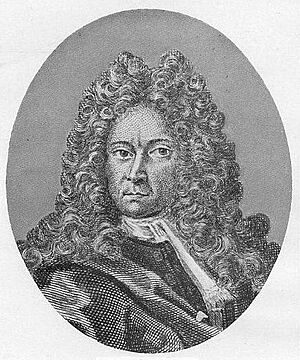Johann Albert Fabricius facts for kids
Johann Albert Fabricius (born November 11, 1668 – died April 30, 1736) was a very important German scholar. He was known for studying old books and writings, especially from ancient Greece and Rome. He also created many lists and descriptions of books, which is why he is called a bibliographer.
Contents
About Johann Albert Fabricius
Early Life and Education
Johann Albert Fabricius was born in Leipzig, Germany. His father, Werner Fabricius, was a music director and writer. Johann learned a lot from his father. After his father passed away, a theologian named Valentin Alberti helped look after him.
Fabricius continued his studies with different teachers. He found two books in a library that gave him an idea. These books were Adversariorum libri LX by Kaspar von Barth and Polyhistor by Daniel Georg Morhof. They inspired him to create his own collections of book information, which later made him famous.
A Career in Learning
In 1686, Fabricius returned to Leipzig. Two years later, he published his first work. It was a critical look at ten writers of his time. He also wrote Decas Decadum, where he used the name Faber.
Fabricius first studied medicine, but then changed to theology. In 1693, he went to Hamburg. He had planned to travel, but he found out that his education had used up all his money, and he was even in debt. So, he had to give up his travel plans.
Instead, he stayed in Hamburg and worked as a librarian for Johann Friedrich Mayer. In 1696, he traveled with Mayer to Sweden. When he came back to Hamburg, he tried to get a job as a professor of logic and philosophy. The votes were tied, so they drew lots, and he didn't get the job.
However, in 1699, Fabricius became a professor of rhetoric and ethics. He kept this job until he died. He was offered positions at other universities, but he chose to stay in Hamburg. He passed away there in 1736.
His son-in-law, Hermann Samuel Reimarus, wrote a book about Fabricius's life and works in 1737.
Johann Albert Fabricius's Works
Fabricius was a very busy writer and scholar. He is credited with writing or compiling 128 books! He was famous for collecting old writings and manuscripts. Many of his books were collections, edited versions, or anthologies (collections of writings).
Bibliotheca Latina
One of his most important and detailed works was the Bibliotheca Latina. This huge collection was divided into sections based on time periods:
- writers up to the time of Tiberius
- writers up to the time of the Antonine emperors
- writers from when the Latin language started to change
- pieces from very old authors
- chapters on early Christian writings
He also added a supplementary volume called Bibliotheca Latina mediae et infimae Aetatis, which covered Latin writings from the Middle Ages.
Bibliotheca Graeca
Fabricius's most famous work is the Bibliotheca Graeca (published between 1705 and 1728). People called it the "greatest treasure of ancient learning." This work was also divided by time periods, starting from Homer and Plato, going through the time of Jesus and Constantine I, and ending with the fall of Constantinople in 1453. It also had a section on religious law, legal studies, and medicine.
Other Important Books
Fabricius wrote many other significant books, including:
- Specimen elencticum historiae logicae: A list of books about logic that he knew about (1699).
- Bibliotheca Antiquaria: A description of writers whose works explained Jewish, Greek, Roman, and Christian history and customs (1713).
- Centifolium Lutheranum: A list of books related to Lutheran beliefs (1728).
- Bibliotheca Ecclesiastica: A collection about church history (1718).
- He also wrote the introduction to Vincent Placcius's Theatrum anonymorum et pseudonymorum (1708), which was about books written by unknown or fake authors.
- Memoriae Hamburgenses: A seven-volume work about Hamburg (1710-1730).
Fabricius also played a big role in helping scholars understand ancient religious texts that were not part of the official Bible. He did this through his collections of texts and excerpts:
- Codex apocryphus Novi Testamenti (1703)
- Codex pseudepigraphus Veteris Testamenti (1713)
- Codicis pseudepigraphi Veteris Testamenti Volumen alterum accedit Josephi veteris Christiani auctoria Hypomnesticon (1723)
These books were widely used and referenced by scholars even into the 20th century.
 | Janet Taylor Pickett |
 | Synthia Saint James |
 | Howardena Pindell |
 | Faith Ringgold |


